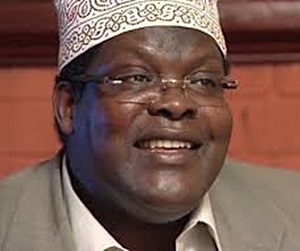Songs Of Fire and Political Elections
 |
| Miguna Miguna |
On the cover you see a drawing of a pen striking a chain which produces a red flame - that is fire. The chain is a familiar sight to persons seeking freedom from oppression. You see people tied by a chain when you examine the history of slavery. You see monuments of a person breaking chains in strategic places in Lusaka, Zambia and Havana, Cuba and many other places. The pen symbolizes a weapon of freedom if carefully used, just as many others have used guns as weapons of freedom.
What you get when you read what is between the covers is a tremendous feeling of freedom. You want to contribute to the process of human liberation. The poems give you a tremendous push towards action. The poems impel you to "do something now." The poems light a fire in you – a fire of and for freedom.
The second thing the book compels you to come to terms with, is the depths of human genius - the capacity of individuals to create when they allow themselves to. You are forced to admire Miguna’s intellectual ability to think and weave today’s everyday occurrences and thoughts into a complex, dynamic and compelling story of human desires and struggles for liberation and freedom. Miguna has achieved literary genius from an early age. He is simply one of the best in the art of modern and socially relevant poetry anywhere.
There are many poems covering many themes in this book but my favourite poem is entitled "Freedom Song." This is where Miguna talks or attempts to communicate to the concept of "UJAMAA." He relates the problem of communication, censorship, struggles and so on. But he is not attempting to communicate to the concept of ujamaa (Swahili word for togetherness in English), he is communicating to you the reader.
You have heard it said that "don't shoot the messenger." In Miguna's book it would be "don't shoot the recipient" of the message. It is the recipient who is the carrier of bad news - radical news, because it is him or her that gets worked up by the message. He wants to act. He wants to tear down the walls. The message is that powerful. You cannot remain indifferent after getting through this powerful book.
This is the book you need in an election season. You cannot afford to be impartial. You cannot sit on the fence. You cannot be neutral in the face of injustice, corruption, politically-motivated violence, tendential dictatorship and in the face of weapons of mass deception. During an election year, the citizens must be the masters of the universe and not the other way round where politicians control the agenda through all types of tools of duplicity. If the people can’t control the message during the elections, how can they hope to control the politics after the elections.
The book leaves you with tremendous hope even when all other options of liberation have been closed. As long as you have a mind, nothing physical can stop you in the long run. Even when your books are not published by the publishers, your mind publishes them.
This is what Miguna says:
Ujamaa, I planned to write
a strong poem
a poem that may be tossed away
rejected by the publishers
because it is too open, too declaratory
not too subtle for print
Yet
We shall print it in our minds
Put it in our brains
rubber stamp our voices with it
Sing it with our voices
and rap it,
our poem shall be in print
So
let the publishers toss it away.
This kind of defiance against the powers-that-be is invigorating. The entire book is this combative. It is refreshing. The background is that Miguna lived as a political exile from Kenya and this book is born out of that experience and is steeped in struggle. Miguna now practices law in both Kenya and Canada. He later wrote other important books which shattered the Kenyan political platforms Peeling Back the Mask and Kidneys for the King.
This book deserves to be read widely. Socially relevant poetry is alive. Let us sing the Songs of Fire.
By Dr. Munyonzwe Hamalengwa
Munyonzwe Hamalengwa's books include Thoughts Are Free: Prison Experience and Reflections on Law and Politics in General (1991), and, Class Struggles in Zambia and the fall of Kenneth Kaunda (University Press of America, 1992). He practiced Criminal and Immigration law in Toronto for 25 years.
